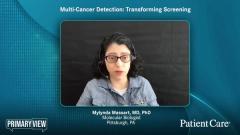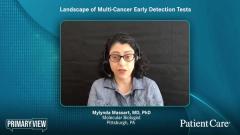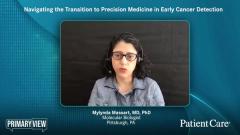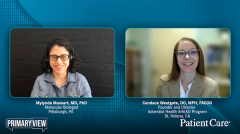
Multi-Cancer Detection: Transforming Screening
Experts discuss the emerging landscape of multicancer early detection testing through liquid biopsy, highlighting its potential to revolutionize cancer screening.
Episodes in this series

Transcript
Candace Westgate, DO, MPH, FACOG: So we know that only about 25% of cancer deaths in the United States are caused by 1 of those 5 cancers that we have current screening for. So as a result of this, there’s a huge unmet need for us to look at this in a different manner, find something differently that can test one person for multiple cancers instead of an individual for individual cancers. Right? So can you talk a little bit more about this emerging landscape of multicancer early detection testing? And do you foresee this [affecting] the cancer screening landscape, and [what] does this look like currently?
Mylynda Massart, MD, PhD: For me, it’s really exciting. I think I feel like you as well. I think, our patients have been waiting for this kind of change in the cancer screening landscape forever. And for over a decade, I’ve had patients coming to me saying, “When are we just going to have a blood test that can just do an annual blood test and screened for cancer?” And every year I’m saying, “Well, you know, there are things in development, there are things that are cooking.” But to finally be able to say it’s here, it’s arrived, and we’re able to do this is incredibly exciting. This emerging technology could really transform and strengthen our current approach to how we screen for cancer. So multicancer early detection is extremely promising. It’s through liquid biopsy, which is a single blood draw. And it is looking at that very current moment in time to see if there are any DNA cancer signals that are hallmarks for cancer traveling in the bloodstream. And then in addition, many of the tests that are being developed not only can they predict if there is a cancer signal at this moment in time in the bloodstream, but it can even predict where that cancer signal of origin is coming from. That can guide our diagnostic evaluation and start looking for those cancers. So I think this is really, really promising. We’ll be able to do a single point of care blood draw, make it so much more accessible, add on to the great screening that we currently have by now looking for more than 50 different cancers in that 1 blood test beyond our kind of 4 or 5 gold standards and hopefully really increase the accessibility of screening.
Candace Westgate, DO, MPH, FACOG: Are you not concerned that patients will just do that blood draw and then not follow up or do the other standard screenings?
Mylynda Massart, MD, PhD: Yeah. I think this is a concern that everyone has, and I think that’s where we as providers have a really big responsibility to provide education. Why this screening doesn’t replace those single-organ cancer screenings, right? So the cancer screenings that we do screen for are the highly prevalent cancers, right? They’re the most common. And so we have very high sensitivities for those cancers because we don’t want to miss them. So that means we trade off more false positives to make sure we don’t miss any colon cancer, we don’t miss any breast cancer, we don’t miss any lung cancer. And so those are really, really important. However, for these rarer cancers where we’ve had no ability to screen at all in the past, we will now have the ability through this blood test to complement or supplement our routine screening and make sure we’re not missing these additional cancers. Now, what will happen over time as the technology evolves remains to be seen. But right now, it’s going to be really incumbent upon the clinicians to encourage patients to actually use this as additive or complementary [screening] to the current screening and not in replacement.
Transcript was AI-generated and edited for clarity.
Newsletter
Enhance your clinical practice with the Patient Care newsletter, offering the latest evidence-based guidelines, diagnostic insights, and treatment strategies for primary care physicians.









































































































































